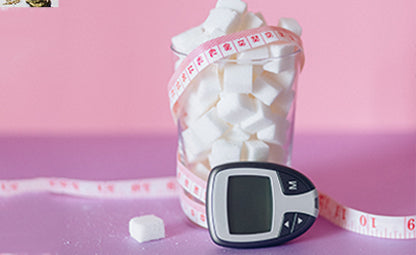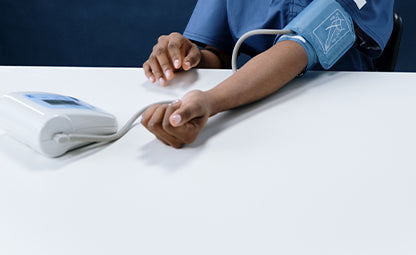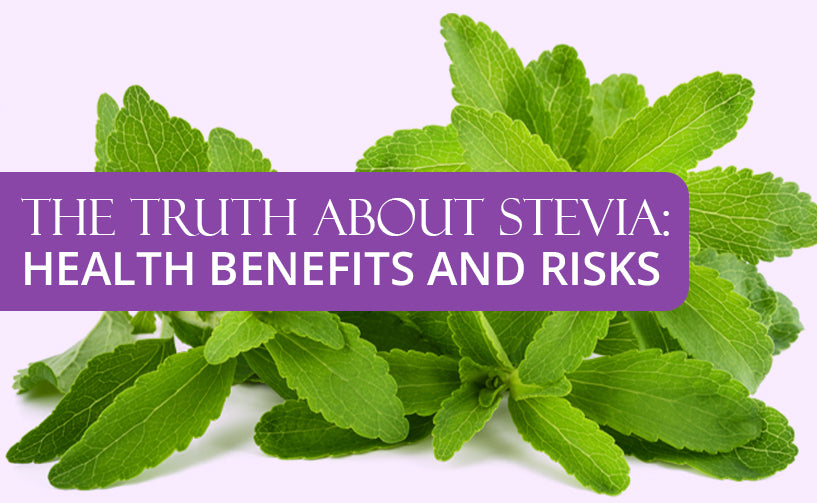If you are someone who has been trying to manage their weight or their blood sugar levels, then you might have come across this zero-calorie, sweet-tasting, natural sweetener called Stevia. This incredible “natural sweetener” has gained quite a name for itself in recent years, thanks to its reputation for being a natural and healthier alternative to common table sugar. In fact, it is claimed to be almost 200 times sweeter than table sugar and healthier as it does not raise blood sugar levels as it contains zero carbohydrates, calories, or artificial ingredients. If you are looking for reasons to try this incredible thing, read on to find out all there is to know about Stevia –what it exactly is, its health benefits, as well as its health risks.
What is Stevia?
Also known as Stevia rebaudiana, Stevia is a small shrub that belongs to the chrysanthemum family with leaves that are intensely naturally sweet. It is native to Brazil and Paraguay and has been used traditionally to sweeten foods and beverages since ancient times. Yet, it is only recently that this plant gained popularity as a healthier replacement for table or refined sugar, mainly because of its naturally sweetening properties and its zero-calorie and carbohydrate content – ideal for managing weight and diabetes! In fact, stevia has now become a staple ingredient in numerous foods and beverages all over the world and has been marketed under many brand names for use at home.
That said, stevia grown at home and the ones on the market are totally different. This is mainly because stevia from the markets is often made from a highly refined stevia leaf extract called rebaudioside A (Reb-A). In fact, some brands don’t even contain whole stevia leaf or have very little stevia in them at all. Sometimes, the extracted sweet component is again blended with several additives or sweeteners like erythritol, dextrose or maltodextrin, to minimize the intense sweetness so that it can be easily incorporated into foods. They are then marketed under the term “natural flavours” and are usually available in liquid, powder and granulated forms. That said, the naturalness of these stevia products is debatable.

Health Benefits of Stevia
Marketed mainly as a natural sweetener and a healthier alternative to sucrose, or table sugar, stevia is considerably low in calories and is also known to possess considerable health benefits. Here are some of the possible health benefits of stevia.
1. Controls Diabetes
Studies have shown that consuming stevia does not have any effect on blood glucose or insulin response, mainly because of its zero-calorie or carbohydrate content. Hence, this makes it a perfect option for people with diabetes, allowing them a wider and healthier option in terms of foods or diet. Likewise, another study on patients with type-2 diabetes also demonstrated that stevia caused significant reductions in blood glucose and glucagon response after a meal. In this way, stevia proves to be a great option for regulating blood glucose levels for people with diabetes.
2. Manages Weight
Due to its incredibly low calorie and carbohydrate content, stevia has been known to help support healthy weight loss and also lowers the risk of overweight and obesity. Added sugar is high in calories, which is often linked to weight gain and unstable blood glucose levels. Stevia’s zero calories and low sugar content prove to be a healthy alternative to added sugar without having to sacrifice tast
3. Manages Cholesterol
As per a 2009 study, it was demonstrated that consuming 20 ml of stevia leaf extract in powder form for a month showed promising results when it comes to managing cholesterol levels. The study also showed a significant reduction in total cholesterol, bad or LDL cholesterol, and triglycerides with no negative side effects, while increasing the good or HDL cholesterol.
4. Lowers Blood pressure
A 2003 study suggested that stevia may help lower blood pressure. This is because the stevia plant exhibits cardiotonic actions that normalize blood pressure and regulate the heartbeat. Nonetheless, more studies are still needed to confirm the heart health benefits of stevia.

5. Healthy for Children
Being naturally sweet and also low in calories, opting for foods and beverages with stevia instead of added sugar can be a great way to lower calories and avoid unwanted sweeteners in the diets of children. This can help lower the risk of overweight and obesity and reduce the risk of developing cardiovascular disease among children, while still enjoying foods and beverages with sweetness in it.
Health Risks of Stevia
Although generally safe for consumption, the key to avoiding major health risks with stevia is to be aware of its quality and its components. As per the American Food and Drug Administration (FDA), products with ingredients containing stevia extract or Stevia rebaudiana, or stevioside, which is a purified form of stevia, are considered best and safe for consumption. On the other hand, products with whole stevia leaves or crude stevia extracts are to be avoided due to a lack of safety information with regards to their potential impact on health. Here are some of the potential health risks of stevia:
- Consuming raw stevia herb may have a negative impact on kidneys, cardiovascular and reproductive systems. It may also significantly lower blood pressure or interact with blood pressure medications.
- Despite being safe for diabetes, one should be cautious of stevia brands that contain sugar alcohols such as dextrose or maltodextrin in them.
- Moderate use of stevia is generally safe but too much of it can contribute to your carb count.
- Stevia products containing sugar alcohols may cause digestive problems, such as bloating and diarrhoea in some people.
- Consumption of stevia made with Reb-A is considered safe during pregnancy, as long as done with moderation. That said, whole-leaf stevia and crude stevia extract may be avoided due to a lack of safety information.
- Another downside with stevia for some people is its taste, which is mostly mild, liquorice-like taste with a slight bitter aftertaste.
How to Use Stevia in Your Foods
This healthy natural sweetener can be used in place of your table sugar. But make sure to check the sugar-to-stevia ratio before incorporating them into your foods and beverages. That said, you can put it on your teas and coffees, smoothies, lemonades and yoghurts, cereal bowls, etc. Lastly, you can also cook and bake with it but baking with stevia can be quite tricky as it does not have the same chemical properties as sugar, which may hinder the texture of the food.
Managing Diabetes with Preserva Wellness
Formulated using potent Ayurvedic ingredients, Preserva’s unique Curcumin-based diabetic care products – Diabetic Care Tea, Diabewell Juice and Diabewell Tablets, are the answer to managing blood sugar levels and lowering the risk of developing type-2 diabetes, naturally! They are packed with herbal goodness and essential nutrients that help against blood sugar spikes and sugar cravings, as well as in lowering blood glucose levels and promoting insulin sensitivity. They are 100% vegetarian with no chemicals, no GMOs, no sugar or gluten, making it completely safe for consumption!
Disclaimer- This article is intended for informational purposes only. It is not a substitute for professional medical advice, diagnosis or treatment. Always consult with your healthcare provider in case of any health complications






